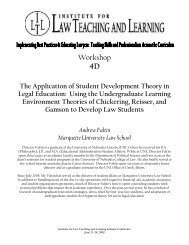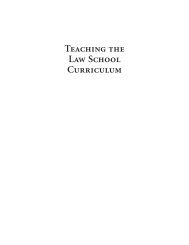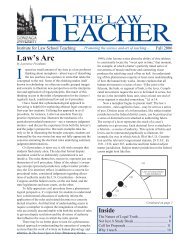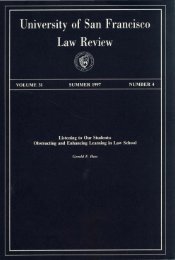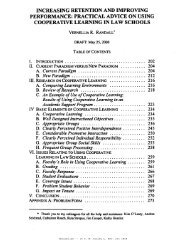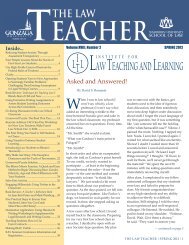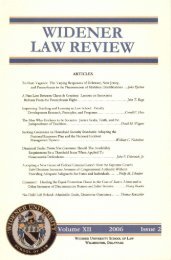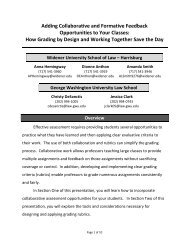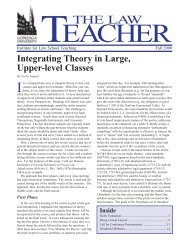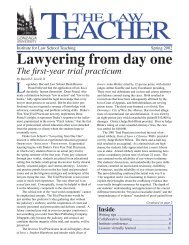The Law Teacher - Institute for Law Teaching and Learning
The Law Teacher - Institute for Law Teaching and Learning
The Law Teacher - Institute for Law Teaching and Learning
You also want an ePaper? Increase the reach of your titles
YUMPU automatically turns print PDFs into web optimized ePapers that Google loves.
<strong>Law</strong> School <strong>Learning</strong> communities:<br />
A Community of Learners <strong>for</strong> the Benefit of All Learners<br />
— continued from page 28<br />
cooperative <strong>and</strong> collaborative learning<br />
techniques <strong>and</strong> academic support skills<br />
that are taught in the smaller seminar<br />
classes in their linked larger substantive<br />
class. Students can accomplish this goal<br />
in a variety of ways, including helping<br />
each other organize study groups,<br />
comparing class notes, <strong>and</strong> helping each<br />
other with exam preparation.<br />
Legal research <strong>and</strong><br />
writing Lcs<br />
<strong>Law</strong> schools interested in enhancing the<br />
learning environment <strong>for</strong> their students<br />
beyond academic support courses <strong>and</strong><br />
workshops may consider utilizing their<br />
Legal research <strong>and</strong> writing (Lrw)<br />
courses as law school Lcs. whether it<br />
is simply getting to know each other’s<br />
names <strong>and</strong> backgrounds or having the<br />
students work collaboratively to answer<br />
a substantive question, providing an<br />
academic atmosphere where students<br />
feel respected <strong>and</strong> safe may be the<br />
pedagogical deviation that some law<br />
schools need to help students more<br />
successfully transition to law school.<br />
Similar to the Lcs cohort <strong>for</strong>mat,<br />
Lrw students are usually in the same<br />
first-year section. <strong>The</strong>y see each other<br />
multiple times throughout the entire<br />
week in their larger doctrinal classes.<br />
Similar to the Lcs seminar courses,<br />
Lrw classes are smaller, so the students<br />
are able to develop relationships with<br />
one another that are difficult to establish<br />
in the larger Socratic-style classes. By<br />
giving the students an opportunity to get<br />
to know <strong>and</strong> work with one another in<br />
their Lrw courses, students can begin<br />
to identify <strong>and</strong> appreciate the benefits of<br />
shared learning, including diversity of<br />
opinions <strong>and</strong> values, as well as increased<br />
confidence <strong>and</strong> self-esteem. Students can<br />
build trust in one another <strong>and</strong> develop<br />
relationships that will help them learn<br />
to learn from one another in the current<br />
semester <strong>and</strong> beyond.<br />
Despite the traditional competitive<br />
nature of law school, students should<br />
feel com<strong>for</strong>table <strong>and</strong> motivated to<br />
collaborate with one another to promote<br />
each other’s academic success. Faculty<br />
teaching Lrw Lcs courses can be more<br />
proactive in encouraging students<br />
to utilize each other <strong>for</strong> assistance in<br />
their larger doctrinal classes. On their<br />
own or through partnership with<br />
the academic support office, LRW<br />
faculty can help eliminate the negative<br />
connotation that sometimes follows<br />
academic assistance by promoting <strong>and</strong><br />
highlighting the benefits of learning from<br />
peers. Moreover, because of the smaller<br />
class size <strong>and</strong> interactive nature of the<br />
course, Lrw faculty may even be able to<br />
help identify those at-risk students who<br />
may need more one-on-one academic<br />
counseling. In these circumstances,<br />
Lrw faculty can help pave the way <strong>for</strong><br />
an earlier intervention from academic<br />
support personnel <strong>and</strong>, potentially,<br />
reduce the number of students who drop<br />
out because of poor grades or feelings of<br />
inadequacy <strong>and</strong> despair.<br />
<strong>Learning</strong> Styles <strong>and</strong><br />
Lrw Lcs<br />
<strong>Law</strong> school academic support <strong>and</strong> other<br />
law teachers have long advocated <strong>for</strong> law<br />
school teaching that reaches a variety<br />
of learning styles. Lrw Lcs may help<br />
establish an environment where a variety<br />
of learning styles can thrive.<br />
collaborative Lrw Lcs may be most<br />
beneficial <strong>for</strong> those interpersonal learners<br />
who prefer to process in<strong>for</strong>mation in a<br />
more social setting. However, LRW LCs<br />
should also benefit students who lack the<br />
extroverted or “out-spoken” personality<br />
traits that often seem to dominate the<br />
Socratic lectures. allowing non-verbal<br />
learners an opportunity to more critically<br />
think about the topics they are learning<br />
while working in a less intimidating<br />
classroom setting may be the<br />
encouraging <strong>and</strong> motivating factors that<br />
will enable the students to gain more<br />
confidence in their oral communication<br />
skills. Likewise, providing the skillsbased<br />
instruction that many Lrw<br />
professors already implement in their<br />
curriculum (such as case management,<br />
mediation, <strong>and</strong> interviewing <strong>and</strong><br />
counseling) should enhance the learning<br />
experience <strong>for</strong> kinesthetic <strong>and</strong> visual/<br />
spatial learners, who prefer h<strong>and</strong>s-on<br />
work or additional time to visually create<br />
a mental image of what they are trying<br />
to learn.<br />
conclusion<br />
<strong>Law</strong> schools interested in assisting<br />
students in their transition to law<br />
school should look to the success<br />
<strong>and</strong> popularity of undergraduate<br />
Lcs. By identifying ways to enhance<br />
confidence <strong>and</strong> relationship building,<br />
<strong>and</strong> by encouraging cooperative <strong>and</strong><br />
collaborative learning, Lrw Lcs may<br />
help students feel as if they “belong” <strong>and</strong><br />
can excel in law school. This approach<br />
may lead students to per<strong>for</strong>m better<br />
academically, have better bar passage<br />
rates, <strong>and</strong>, generally, have a better<br />
transition to law school.<br />
____________<br />
Oscar J. Salinas is clinical assistant professor<br />
of law at the University of North Carolina<br />
School of <strong>Law</strong> at Chapel Hill. He can be<br />
reached at osalinas@email.unc.edu.<br />
<strong>The</strong> <strong>Law</strong> <strong>Teacher</strong> | FaLL 2012 | 29



